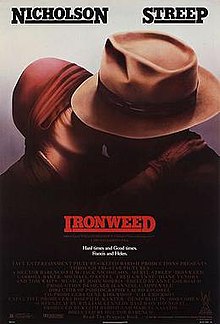Ironweed (film)
| Ironweed | |
|---|---|
 Theatrical release poster by John Alvin | |
| Directed by | Héctor Babenco |
| Screenplay by | William Kennedy |
| Produced by | Keith Barish Marcia Nasatir |
| Starring | |
| Cinematography | Lauro Escorel |
| Edited by | Anne Goursaud |
| Music by | John Morris |
Production company | |
| Distributed by | TriStar Pictures |
Release date |
|
Running time | 143 minutes |
| Country | United States |
| Language | English |
| Budget | $27 million |
| Box office | $7,393,346 |
Ironweed is a 1987 American drama film directed by Héctor Babenco. It is based on the Pulitzer Prize-winning novel of the same name by William Kennedy, who also wrote the screenplay. It stars Jack Nicholson and Meryl Streep, with Carroll Baker, Michael O'Keefe, Diane Venora, Fred Gwynne, Nathan Lane and Tom Waits in supporting roles.
The story concerns the relationship of a homeless couple: Francis, an alcoholic, and Helen, a terminally ill woman during the Great Depression. Major portions of the film were shot on location in Albany, New York, including Jay Street at Lark Street, Albany Rural Cemetery and the Miss Albany Diner on North Broadway.
The film was nominated for Academy Awards for Best Actor in a Leading Role (Nicholson) and Best Actress in a Leading Role (Streep).
Plot synopsis
Francis Phelan (Jack Nicholson) is a washed-up baseball player who deserted his family back in the 1910s when he accidentally dropped his son and killed him. It is assumed in the film that he was drunk at the time until he later claims he was just tired and doesn't understand why no one will believe in his story. Since then, Phelan has been a bum, punishing himself. Wandering into his hometown of Albany on Halloween in 1938, Phelan seeks out his lover and drinking companion, Helen Archer (Meryl Streep). The two meet up in a mission managed by Reverend Chester (James Gammon), and later in Oscar Reo's (Fred Gwynne) gin mill.
Over the next few days, Phelan takes a few minor jobs to support Helen, while haunted by visions of his past. Francis comes back to his old family house and tries to make peace with his wife Annie Phelan (Carroll Baker), his son Billy (Michael O'Keefe) and Peg (Diane Venora). Meanwhile, a group of local vigilantes take it upon themselves to drive the homeless out of Albany. During the course of the day, a series of events change Francis' life forever.
Cast
- Jack Nicholson as Francis Phelan
- Meryl Streep as Helen Archer
- Joe Davis as Young Man Driving Car
- Carroll Baker as Annie Phelan
- Michael O'Keefe as Billy Phelan
- Diane Venora as Margaret "Peg" Phelan
- Fred Gwynne as Oscar Reo
- Margaret Whitton as Katrina Dougherty
- Tom Waits as Rudy
- Nathan Lane as Harold Allen
- James Gammon as Reverend Chester
- Laura Esterman as Nora Lawlor
- Joe Grifasi as Jackson
- Hy Anzell as Rosskam
- Ted Levine as Pocono Pete
- Black-Eyed Susan as Clara
- Frank Whaley as young Francis Phelan
Reception
Critical response
The film received mostly positive reviews. The review aggregator Rotten Tomatoes reported that 65% of critics gave the film a positive review, based on twenty reviews.[1] At the time of its release it garnered enthusiasm because of the presence of stars Jack Nicholson and Meryl Streep.
Roger Ebert wrote, "Nicholson and Streep play drunks in Ironweed, and actors are said to like to play drunks, because it gives them an excuse for overacting. But there is not much visible 'acting' in this movie; the actors are too good for that." Ebert gave the film three stars out of four.[2]
Streep received raves from most critics; Janet Maslin of The New York Times wrote that "Meryl Streep, as ever, is uncanny. Miss Streep uses the role of Helen as an opportunity to deliver a stunning impersonation of a darty-eyed, fast-talking woman of the streets, an angry, obdurate woman with great memories and no future. There isn't much more to the film's Helen than this, and indeed the character may go no deeper, but she's a marvel all the same. Behind the runny, red-rimmed eyes, the nervous chatter and the haunted expression, Miss Streep is even more utterly changed than her costar, and she even sings well. The sequence in which Helen entertains the real and imagined patrons of a bar room with a rendition of 'He's Me Pal' is a standout."[3]
Frederic and Mary Ann Brussat appreciated the film's spiritual message, writing, "Mixing realistic and surreal scenes, Argentinean director Héctor Babenco puts the accent on what he calls the spiritual dimensions of William Kennedy's Pulitzer Prize-winning novel... If you ride with the emotional undertow of Ironweed, there's no way you'll ever look at street people in quite the same way".[4]
Awards
Won
- Los Angeles Film Critics Association: LAFCA Award, Best Actor, Jack Nicholson; 1987.
- New York Film Critics Circle Awards: NYFCC Award, Best Actor, Jack Nicholson, 1987.
Nominated
- Academy Award: Best Actor in a Leading Role, Jack Nicholson; Best Actress in a Leading Role, Meryl Streep; 1988.
- Golden Globe Award: Best Performance by an Actor in a Motion Picture - Drama, Jack Nicholson; 1988.
- 16th Moscow International Film Festival: Golden St. George, Hector Babenco; 1989.[5]
References
- ^ Ironweed at Rotten Tomatoes. Last accessed: January 29, 2011.
- ^ Roger Ebert (February, 1988) "Ironweed"
- ^ Maslin, Janet. The New York Times (December, 1987) "Ironweed (1987) Film: 'Ironweed,' From Hector Babenco"
- ^ Brussat, Frederic and Mary Ann. Spirituality & Practive, film review, February 1988. Last accessed: January 29, 2011.
- ^ "16th Moscow International Film Festival (1989)". MIFF. Retrieved 2013-02-24.
External links
- Ironweed at IMDb
- Ironweed at AllMovie
- Ironweed at Rotten Tomatoes
- Film trailer at YouTube
